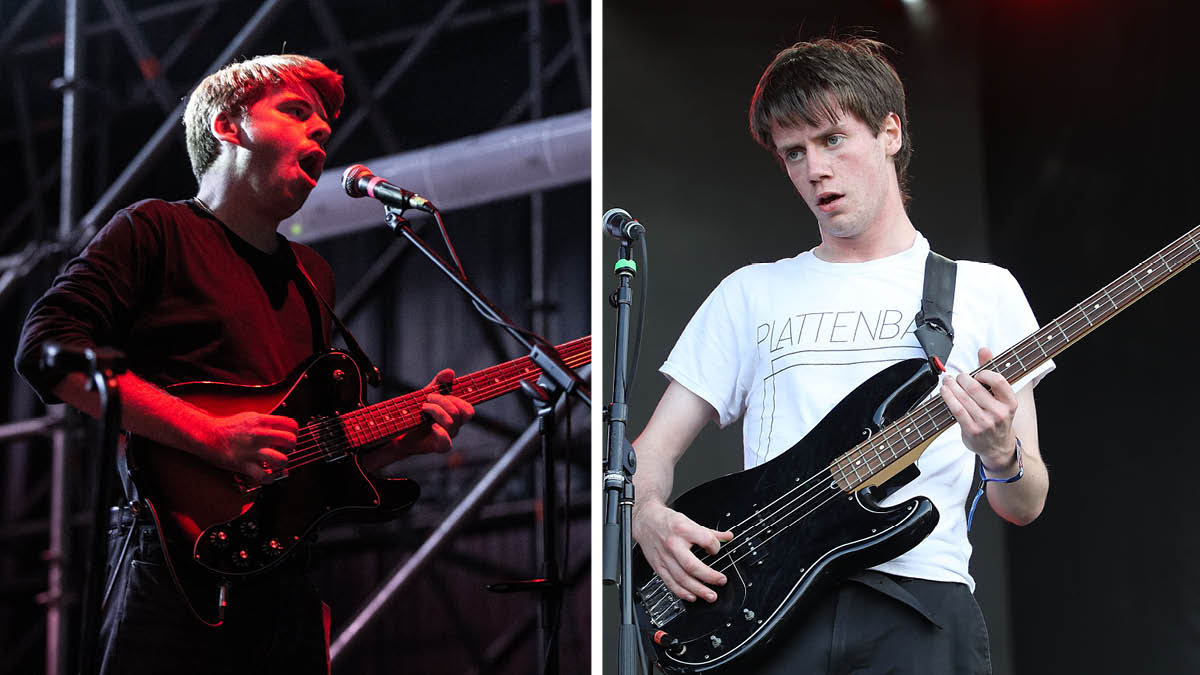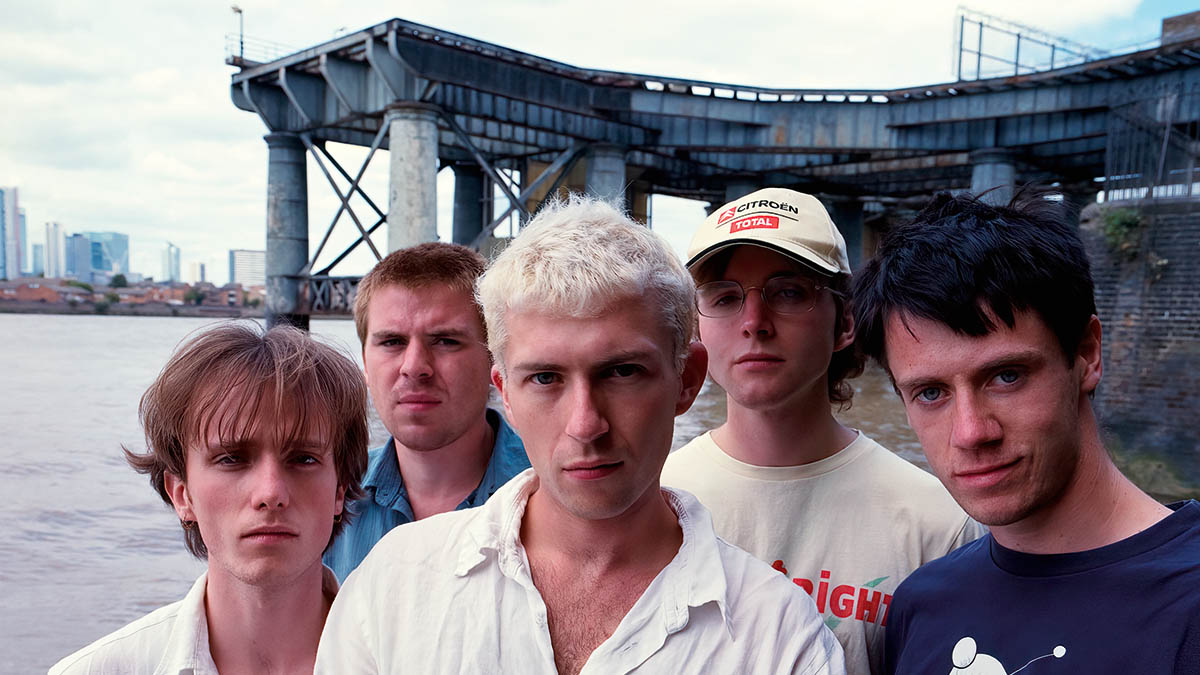Shame's Josh Finerty and Eddie Green discuss the three-guitar magic behind the London post-punks' exhilarating sound
How single-coil pickups, stone room reverb and a DIY ethos turned the chart-topping Londoners a deep shade of Drunk Tank Pink

Shame exploded out of the same south London gig circuit that brought you black midi and Black Country, New Road. They share those bands’ love of post-punk and indie aesthetics, but where black midi offer sprawling odd-time epics, Shame specialise in three-minute gut-punches.
That ear for a hook made their 2018 debut Songs Of Praise an unexpected Top 40 success. The follow-up, Drunk Tank Pink, was released in January, landing at #8 on the UK album chart. What’s unusual about Shame is that they have three guitarists – the correct number, in our opinion.
Originally, Eddie Green played rhythm and Sean Coyle-Smith played lead, but over time these roles have become blurred, with Josh Finerty, nominally the band’s bassist, also contributing guitar parts. Despite this, Drunk Tank Pink is a tight album with plenty of space.
“With the first record, we hashed it all out playing in a room together,” Josh says. “But on this one we set up mics in my room and started DIY recording. We’d come up with an idea without being able to play together. We’d layer a bunch of stuff on and cut certain things out.”
Eddie explains: “Having a moment to step back from the song, to add things and take them away as you’re going, assisted it not sounding like three guitars mushed. It was easier to isolate different parts.”
This considered approach sees the band layering parts cleverly; Sean and Eddie rarely play the same thing.
As Josh recalls: “When we started the band, it was like, ‘Eddie’s rhythm guitar and Sean’s lead guitar.’ Sean would just solo in every song, basically. As it went on we tried to do more interplay, cutting it down a lot, doing a lot more single notes and trying to harmonise each other in that way.”
Get The Pick Newsletter
All the latest guitar news, interviews, lessons, reviews, deals and more, direct to your inbox!
We were into playing the same note for like five minutes but making it sound good. I just don’t think we were cool enough to pull it off. Energy is our thing. We put out songs that are immediate
Josh Finnerty
Like their post-punk-inspired peers, Shame’s guitar tones rely on single-coil pickups, usually Fenders, and vintage amps. Eddie summarises their recording guitars: “Lots and lots of Teles! I was using an American Standard Tele for pretty much everything. For a few little additions I used a Gibson semi-acoustic with P90s.
“A lot of the time, Sean used the same American Tele for his parts just because it cut through nicely,” adds Josh. “I used a P-bass for a lot of it, and then doubled a lot of the bass parts with the producer’s Squier Bass VI with flatwound strings. It just sounded massive.
“We’ve now bought one ourselves and it’s become the main bass live. Sometimes [with a normal bass] there’ll be a lot of mud because of all the subs from the bass when want all the parts to gel together a bit more.”
Guitar amps were resolutely vintage. Eddie used a Fender Princeton and a vintage Selmer Zodiac combo, while Sean largely used a Supro Black Magick.
“The Selmer scared me a bit because it seemed like the sort of thing where if you tap it too hard it’s just gonna explode,” Eddie says. He sometimes used an Audio Kitchen The Big Trees pedal amp into that pair: “You had to be really careful not to make it complete overkill, but it was definitely fun. You can get like a nice clean a nice clean boost or a slight crunch, but then you can like really whomp up the gain and it’s just insane.”
The reverb sounds on Drunk Tank Pink are awesome, captured the old-fashioned way. “We actually went in quite dry for the guitar takes,” Eddie says. “They had a stone room in the studio, like a bunker or something, where we recorded the drums. You hit a snare in there and it sounded like a gunshot. Sometimes we’d set up guitar amps in there with room mics. That’s where a lot of the reverb came from. We cut down on the amount of reverb we were using. We wanted it to be a bit more in your face and a bit more rhythmic.”
With that intentional reduction in reverb, pedals were relatively minimal. Eddie sometimes steps on his Wampler Euphoria drive, and album closer Station Wagon features pitch shifted delays shooting into the stratosphere courtesy of Sean’s EarthQuaker Rainbow Machine, but the only frequently employed effect is vibrato.
“We used the TC Electronic Shaker Mini,” says Eddie. “We just like the sound of them. Obviously you can really go down the rabbit hole with those kinds of effects but we like the Shaker because it’s straightforward.”
He takes a similarly no nonsense attitude to the ProCo Rat that sits on his live pedalboard. “I don’t know what Rat I have. Whenever I talk to other guitarists they’re like, ‘Oh, what Rat is it?’ It’s a Rat, mate. It’s the one in the shop.”
Exactly what you need for writing three-minute punk songs, then. “We like to be somewhat precise about the gear we’re using to make sure it works for what we’re trying to do, but we’re not gonna sit there for hours discussing different chip sizes and circuits.”
The Rat is used for bursts of feedback between songs, while the Euphoria provides a more subtle tone. Eddie is an exponent of twin delay pedals, the TC Electronic Echobrain and the Boss DD-3. “One’s analog, and one’s digital. I use the Echobrain for doubling sounds in the middle of songs. The time knob creates an almost synthy sound which is cool when you’re writing because you can adjust it to match the key. The Boss is just for real industrial heavy machinery noise.”

His number one live axe is a newly-acquired Telecaster Deluxe. “It’s double humbuckers, so can be big when you want it to,” he says. The American Standard Tele used to record Drunk Tank Pink comes out live for songs in different tunings. They all go into an Orange Tiny Terror, which is joined by a Fender Hot Rod DeVille.
Happily, the commercial success of Drunk Tank Pink hasn’t yet gone to the band’s heads. When asked about having a top 10 album, Eddie replies, “I think we were pleasantly surprised when that came through,” as though talking about an unexpected cake delivery. “It’s nice everyone’s breaking through,” adds Josh. “It’s fun seeing your friends or yourself in the charts alongside major international artists.”
Among those friends are Squid, who share Shame’s Talking Heads-esque vocal delivery. “I think they’re both just trying to copy David Byrne,” says Josh bluntly.
Eddie interjects, “Some people were like, ‘Oh you’re really trying to sound like Squid now.’ It’s like, we’re doing the same thing here, guys!” Unlike Squid, however, you are unlikely to an encounter a 10-minute jam at a Shame gig. “You’ve got to take into account the average human attention span,” Eddie smiles.
Josh admits they have attempted experimental epics. “We were all super-into Krautrock when we started the band. I feel like we tried to write Squid songs for our first two years. Before Squid existed we were into playing the same note for like five minutes but making it sound good. We have all these voice memos called things like ‘Kraut Jam 38’.
“I just don’t think we were cool enough to pull it off. Energy is our thing. We put out songs that are immediate.” Although their songs are more compact, Shame have as much musical ambition as their more experimental contemporaries.
“When we started, we were all listening to the American post-punk that was happening, like Protomartyr and Preoccupations,” Josh recalls. “We were listening to all this weird time signature shit, really experimental cool stuff. Then black midi came and just absolutely smashed that.
“We didn’t see many bands in the UK doing it at that point. Those guys are so extremely musically proficient that it’s kind of scary. I don’t think we sound like them, but we’ve all played together a lot. We want to keep pushing the boat out.”
Josh attributes the band’s success to one thing: “Play all the shows you get! I don’t know what else did we did. At school I spent the whole time being berated by teachers. I had A Levels coming up and they were like, ‘You literally have five shows this week. What are you doing?’
“My entire memory of early Shame was playing all the time. The main thing we got from playing those shows was just getting better at our instruments. There’s a certain practice playing live that you don’t really get in a rehearsal room.”
That training came into its own in June, as Shame were finally able to tour in support of the album six months after its release.
“It’s been amazing,” says Eddie. “Going out on a run of shows was a really great experience. We felt lucky to be doing that. You get a real vibe that everyone’s grateful to be out, especially watching live music which they’ve been deprived of for so long.”
- Drunk Tank Pink is out now via Dead Oceans.
“Imagine the roaring intensity of Meshuggah’s live performances echoing through your rig”: Meshuggah’s world-ending guitar tones are now available in a signature pedal
Green Day’s Billie Joe Armstrong tackles one of Randy Rhoads’ most iconic solos – tapping and all – in live cover of Ozzy Osbourne’s Crazy Train










